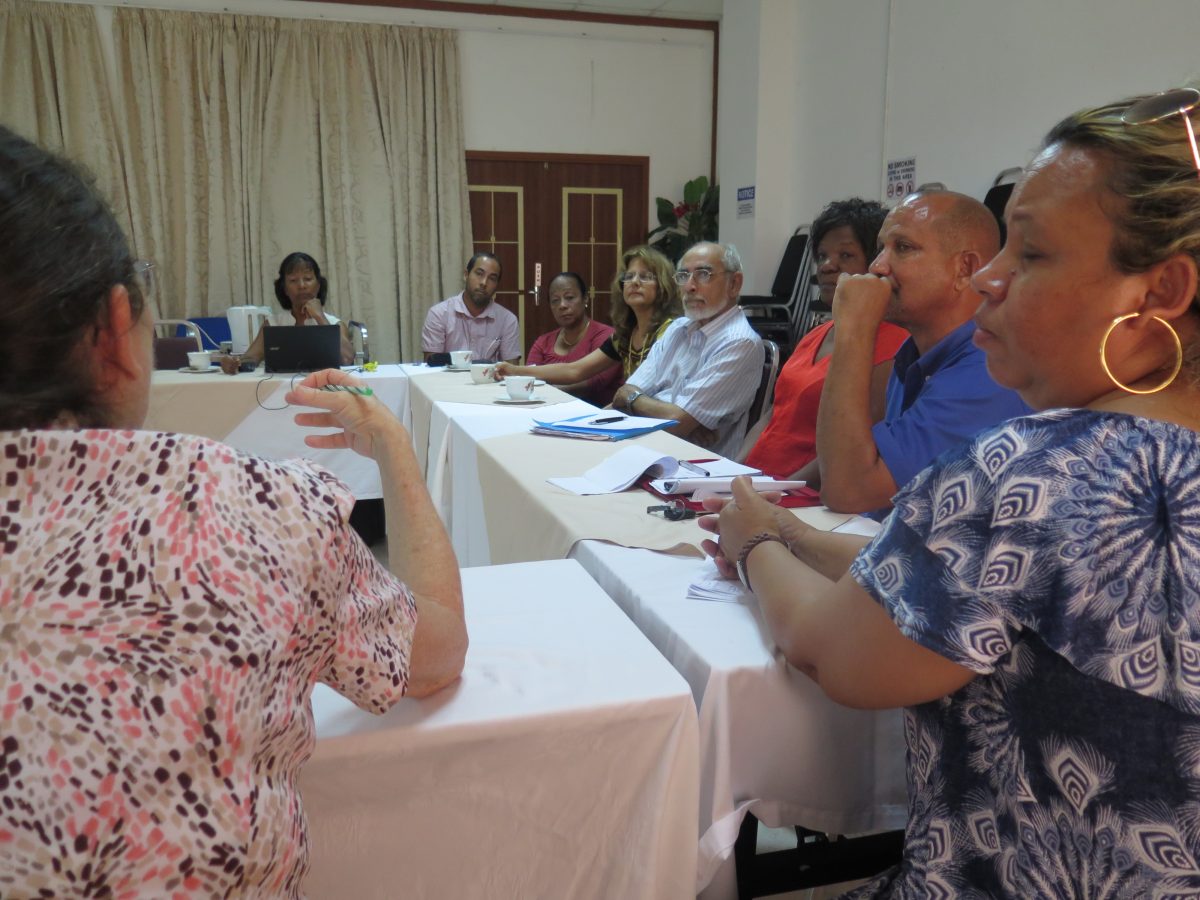3 February 2017
Background:
For the past 27 years, civil society in Seychelles has had representation through a Liaison Unit for Non-Governmental Organization (LUNGOS). The unit has since been transformed into the “Citizens Engagement Platform Seychelles” (CEPS) a platform that aims to regroup all types of civil society organizations in the country.
During the past 27 years, civil society has actively advocated for citizens to fully enjoy the rights to access of information as stipulated in Article 28 of the Seychelles Constitution. Both LUNGOS and CEPS, advocated and lobbied for a law that would guide the three branches of government in giving out accurate information in a timely manner. The need for such a law was lobbied at both national and international level, in the various forums where matters relating to human rights, equality and freedom of the press were being discussed.
On the 19th of January 2015, twenty of CEPS’ members were present at the meeting with the Special Rapporteur on Freedom of Expression and Access to Information (AIT) for Africa, Faith Pansy Tlakula. From the discussions, CEPS made a commitment as a partner of the Seychelles Media Commission to support and contribute towards the process of drafting the bill.
In May of 2015, CEPS representatives sat alongside the many stakeholders that had gathered to make contribution towards the content of the bill.
CEPS welcomed Vice-President Vincent Meriton and members of the Department of Information Secretariat for a presentation and discussion on the Right to Information Bill.
Following this meeting, CEPs members gathered on Monday 23rd of January to contribute towards a white paper on the proposed bill.
The point brought forward by CEPS members are to be found below.
Purpose of the meeting: to discuss the merits and propose amendments to the White Paper on the Right to Information Bill, 2016
General Comments:
1. Name of the Bill
Members suggested that since the Seychelles 1993 Constitution in Part I and in the Seychellois CHARTER of Fundamental Human Rights and Freedoms guarantees the Right of access to official information in Section 28, the Bill is not about the right to information, but about the practical modalities to guarantee or facilitate actual physical or otherwise access to information.
The name of the Bill should read: Access to Information Bill, 2016
2. Corrections
In the Bill, in various sections, the text reads “right to right to information”. It is proposed that this is amended to read instead: “right of access to information”.
3. Vigilance regarding definitions and clarity of procedures
3.1 Definitions
Members were advised to remain attentive to the definitions given to the terms: information and Information Officer to ensure that when the Bill goes before the National Assembly that it is not diluted or amended in such ways as to change to the citizens’ disadvantage the exact meaning of these terms or include or exclude pertinent issues linked to these terms.
It is important to ensure that the definition of information does include data and information on the general activities of the entity as well as the performance data, as it is vital to know whether a public-funded organisation is efficient and effective in the delivery of services as per its mandate.
Public Service Orders and Parastatal manuals should be amended to incorporate the right to access to information and stipulate what those are in accordance with this Act.
3.2 Right of appeal procedures
CEPS requests more detailed information on the right of appeal of decisions made by the Information Commission, either through its own mechanisms and procedures or through those established by the Human Rights Commission and the Ombudsman. It is important to know which procedures have precedence and which ones in terms of phases or steps the citizen can use to appeal the Information Commission’s decisions.
4. Employment and deployment of Public Information Officer (PIO)
There were concerns about the practicalities of employing and deploying PIO in organisations. Calculations indicate that there may be a need to employ at least 150 new people in this post and this is unfeasible, and costly. It is the role of every person in charge of any agency or Ministry to ensure that there is collection and storage of data and information. Members questioned the need for an additional person in the ministry or parastatal or agency. The Chief Executive Officers and the Principal Secretaries should have oversight of the processes of data collection, information and access, and ultimately they have the responsibility of providing information requested. The PIO position may simply add another level of bureaucracy.
It is proposed that this issue is considered and steps are taken to ensure that the final decision is actually one that is practical and feasible.
5. Access to information
Organisations should automatically be placing their data and information online for cost-effective access by the public. If the member of the public wishes for more detailed information not presently available online, then he or she can request such from the organisation. Moreover, as there are clearly more frequent requests, these could be placed online as Frequently Asked Questions (FAQs).
Specific issues
1. Information Officer and Public Relations Officer
There is a need for clarification of the roles and functions of the Public Information Officer (PIO) and how these are similar or different from the ones undertaken by the Public Relations Officers (PRO), already employed in many organisations. Another important distinction is whether the role of the PIO is similar in any to that of the Documentation Officer, also already present in some departments and agencies.
2. Use of the term “substantially”
The term “substantially” appears in the Bill a few times. As this gives rise to a subjective evaluation and could lead to unjust decisions taken affecting access to information, it was proposed that it is either removed or given a more specific definition or at least clarified.
3. Appointment of the Public Information Commissioner and the other members of the Information Commission
There were two main issues of concern here: (i) CEPS questioned the need for another commission in Seychelles and (ii) the appointment by the President of the Information Commissioner. For the former, it was proposed that one of the existing commissions should take this role, instead of creating another one, with the expected high costs and budgets and possible ineffectiveness, as experienced with present commissions. As for the second issue, should the proposal of establishing a commission remain, CEPS proposes that the post be advertised nationally and competent citizens apply for these; the final appointment should be by the National Assembly.
4. Persons with disabilities’ access to information
CEPS notes that the Seychelles has signed the Convention on the Rights of People with Disability and that such persons have charity status in Seychelles. Therefore, it proposes the following amendments:
(a) On page 5, in the definition of “persons with disabilities”, the term “sensory impairments” should be replaced by naming specifically the type of disabilities covered by the definition. For example, the words “blind”, “deaf” should be inserted. This is required to ensure that the definition is clearer.
(b) It should be stated in the Bill that persons with disabilities are not required to pay for both translation and interpretation fees. These are covered by the service provider.
(c) Where the Bill mentions translation, it should also include interpretation to ensure that the deaf is also included in the procedure to access information.
(d) The term ‘Interpretation’ should include sign language, Braille, etc.
5. Exemptions
CEPS is concerned about the various exemptions in Part 3, Section 22 (1) a and b. Specifically, there is a need for clarification on the following terms: “trade secrets”, “substantially prejudice” and “commercial interest”. It is believed that any public organisation operating commercially should make their information available to the public to avoid opaqueness of transactions made in the name and with funds from the public, who are the shareholders of the company.
Section 25 a: CEPS proposes that the Section either be redrafted or that it is removed as there should be more openness in international agreements made in the country’s name.
Section 26: it is important for the public to know how the interest and foreign exchange rates are devised and calculated. There should be more openness about these processes.
Section 27 d: CEPS seeks further clarification on how the access to information can impact the collection of taxes and duties.
Section 28 d: CEPS proposes that the relation of the priest, pastor or spiritual guide and a member of his or her congregation be included.
6. Amendments to Sections
1. Section 5 (1): CEPS proposes “21 days” instead of 30.
2. Section 5 (2) f: CEPS proposes that the text is amended to ensure that it includes: “contracts, contract allowances, benefits, and gratuities.” The information should be available as public funds are used for these and there should be explanations if queries are made.
3. Section 9 (1): CEPS proposes that the request to access information should be made in any form from the requester not only in writing. Having the request made in writing is discriminatory as it eliminates a number of people who cannot use this means of communication.
4. Section 9 (2): CEPS proposes that “shall” is replaced with “may be”.
5. Section 9 (5) b, c and d: CEPS seeks further clarification of the issues raised in the Section, particularly sub-sections b and d.
6. Section 10 (1): CEPS seeks further clarification: does the Section mean that the requester will be assisted to make another request in another form or that he or she will have access to the information?
7. Section 11 (2): CEPS requests that the Section is reviewed as in its present form, it seems unnecessarily bureaucratic and cumbersome. Moreover, it gives the impression that the citizen is asking for permission to have information when the right is a constitutional one.
8. Section 11 (3): the article shall include “interpreter fees” and documents should be available in the three national languages. (do we include here the point about the fact that since we have three national languages there should be no translation fees charged if the documents are requested in any of the three languages…)
9. Section 15 (1) a: CEPS proposes that this Section is removed, as the information is of a public nature and needs to be discussed before presenting to the National Assembly.
Conclusion:
As a civil society platform, the right of access to information is crucial to the work of CEPS. This is why our organisation spared no time in engaging our members in discussions on the White Paper on Right to information Bill, 2016 once this was made public. In reality, the comments and proposals are the result of consultation with a broad range of CEPS members, starting with a presentation on the White Paper made by the Vice President and his Team followed by further research and analysis of the document.
The outcome of the exercise is a clear indication of the commitment of CEPS to bring our members and the citizens in general for that matter, to exercise their right to take part in the conduct of public affairs as guaranteed under Article 24 (a) of the Constitution of Seychelles. As far as the for the Right to Information Bill such commitment was made in January 2015 with the Media Commission when CEPS pledged its support to contribute towards developing its content. We are pleased that this commitment has been honored.
CEPS congratulates all partners who have contributed towards the 2016 Right to Information Bill and wish to thank the government for creating the opportunity for citizens to discuss its contents and put forward their contribution, in line with good democratic principles of governance.



